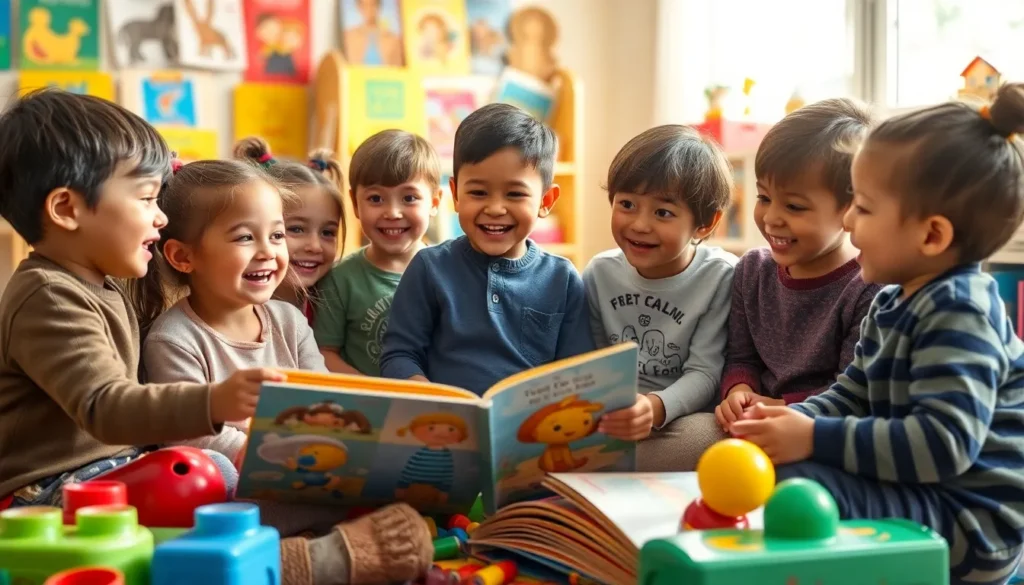Table of Contents
ToggleIn a world buzzing with screens and distractions, early literacy development might just be the superhero every child needs. It’s not just about teaching kids to read; it’s about unlocking a treasure chest of imagination, creativity, and critical thinking. Imagine a tiny human wielding a book like a magic wand, conjuring up stories that make them giggle, gasp, and dream big.
Starting this journey early can set the stage for lifelong learning. Research shows that children who dive into reading before they hit school have a leg up on their peers. So why not sprinkle some fun into those formative years? With the right tools and a dash of enthusiasm, parents and educators can turn reading time into an adventure that shapes the future. After all, who wouldn’t want their child to grow into a confident reader ready to conquer the world?
Overview of Early Literacy Development
Early literacy development establishes essential skills for reading, writing, and overall communication. Children acquire foundational concepts such as print awareness, phonemic awareness, vocabulary, and comprehension during this stage. Engaging in activities like storytelling, shared reading, and interactive games enhances these skills.
Development occurs primarily through play and exploration. Exposure to a variety of texts, including books, magazines, and digital content, fosters a love for reading. Parents and educators play a pivotal role in creating literacy-rich environments where children thrive. Encouraging conversation and asking open-ended questions stimulates critical thinking and creativity.
Research indicates that children who engage in early literacy activities, such as rhyming and singing, display improved language skills. By age five, familiarity with letters and sounds significantly impacts future reading success. For instance, understanding that letters represent sounds lays the groundwork for phonics instruction in school.
Supportive practices include reading aloud daily and discussing stories. Introducing diverse and culturally relevant materials broadens children’s perspectives and nurtures empathy. Sustained interactions with texts contribute to vocabulary growth and comprehension.
Awareness of the connection between literacy and future academic performance highlights the urgency of early engagement. Developing literacy skills before formal schooling increases the likelihood of children becoming proficient readers. Communities also play a critical role in supporting literacy initiatives, ensuring all children have access to resources.
Fostering early literacy development not only prepares children for school success but also cultivates lifelong learners.
Importance of Early Literacy Development
Early literacy development plays a pivotal role in shaping a child’s future. This foundation not only enhances reading abilities but also influences various areas of growth.
Cognitive Benefits
Cognitive skills thrive with early literacy engagement. Research shows that children exposed to reading activities demonstrate improved language development and critical thinking abilities. Engaging in storytelling and rhyming enhances phonemic awareness, essential for decoding words. Children also develop stronger vocabulary skills as they connect new words with their meanings. A focus on comprehension through discussions about stories nurtures analytical thinking. These cognitive gains significantly contribute to future academic success.
Social and Emotional Benefits
Social and emotional growth flourishes through early literacy. Sharing books encourages bonding between parents and children, fostering strong relationships. Exposure to diverse characters and narratives helps children build empathy and understand different perspectives. Participating in group reading sessions promotes cooperative behavior, teaching children to share and communicate effectively. Furthermore, developing literacy skills boosts confidence, allowing children to express themselves more freely. This emotional resilience plays a vital role in forming healthy social interactions.
Stages of Early Literacy Development
Understanding early literacy development involves recognizing distinct stages that children progress through as they learn to read. Each stage lays a critical foundation for subsequent literacy skills.
Pre-Reading Stage
Children in the pre-reading stage engage with books and stories, developing curiosity about written language. Activities such as shared reading, storytelling, and letter recognition form the backbone of this stage. Exposure to print leads to awareness of how books function; for example, turning pages and recognizing that text conveys meaning. Parents often utilize rhymes and songs to enhance phonemic awareness. Young children delight in illustrations, linking images to words while building vocabulary. This foundational knowledge directly supports later literacy achievements.
Emergent Reading Stage
At the emergent reading stage, children begin to recognize letters and sounds more independently. They often start to connect spoken language with written text. Phonics instruction plays an important role, emphasizing the relationship between letters and sounds. Engaging in repetitive reading helps solidify their understanding of story structures and promotes word recognition. Children increasingly participate in interactive reading experiences, where asking questions enhances comprehension. This stage is marked by children’s growing confidence as they experiment with reading familiar stories.
Early Reading Stage
The early reading stage signifies a shift as children move toward more independent reading. They recognize common sight words and demonstrate fundamental reading strategies such as predicting, summarizing, and self-correcting. Reading more complex texts builds comprehension skills alongside vocabulary expansion. It’s common for children to express preferences for specific genres or authors, showcasing their developing interests. Peer discussions enhance their analytical thinking, making connections between texts and their own lives. This stage fosters not only reading fluency but also a lifelong love for learning through literature.
Strategies to Promote Early Literacy Development
Promoting early literacy development involves various effective strategies that engage children and foster their reading skills. Each strategy plays a crucial role in nurturing a child’s growth in literacy.
Reading Aloud
Reading aloud creates a shared experience that enhances children’s understanding of language. This practice introduces new vocabulary and concepts while developing their listening skills. Parents and educators should choose diverse texts, including fiction and non-fiction. Discussing the story as it unfolds encourages children to think critically about the content. Engaging in expressive reading and using different voices makes stories come alive, capturing children’s interest more effectively. Setting a regular reading time can also create a comforting routine. Research shows that daily reading sessions significantly boost language skills and vocabulary acquisition.
Interactive Storytelling
Interactive storytelling captivates children’s attention while promoting engagement and imagination. Encouraging participation by asking open-ended questions helps develop comprehension skills. Children can illustrate their interpretations of stories, making the experience more personal and enjoyable. Involving props or puppets adds a tactile element, stimulating creativity and enhancing memory retention. Creating stories together fosters collaboration and boosts children’s confidence in their ideas. Keeping storytelling sessions lively and varied keeps children eager for more. Studies indicate that creative storytelling practices lead to better narrative skills and enhance overall language development.
Phonemic Awareness Activities
Phonemic awareness activities are vital in building a strong foundation for reading. Engaging children in games that focus on sounds helps them recognize the building blocks of words. Actions like clapping syllables or rhyming can be integrated into daily routines, making learning fun. Utilizing songs and chants encourages familiarity with letter sounds. Encouraging children to manipulate sounds through blending and segmenting builds their confidence and strengthens their decoding skills. Incorporating visual aids, like letter cards, can also reinforce learning. Research highlights that children with strong phonemic awareness develop essential reading skills more effectively.
Challenges in Early Literacy Development
Early literacy development faces several challenges that can hinder children’s progress. Addressing these challenges is crucial for fostering effective reading skills.
Home Environment Factors
Home environment factors significantly impact early literacy development. Limited access to books creates barriers, as children without diverse literature struggle with language exposure. Noise distractions during reading sessions affect focus and comprehension. Parents’ literacy skills influence children’s attitudes towards reading; children with less literate role models may show reduced interest in books. Additionally, the use of technology can detract from engaging in traditional reading. Negative experiences or a lack of encouragement from caregivers further inhibit a child’s reading journey.
Educational System Limitations
Educational system limitations pose another challenge in early literacy development. Class sizes that are too large reduce individual attention for students. Insufficient teacher training in literacy instruction affects the quality of education. Outdated curricula may fail to incorporate innovative teaching methods, limiting engagement with new literacy activities. Additionally, schools in underfunded areas may lack resources, including books or technology, necessary for effective literacy programs. These systemic issues contribute to inequalities in literacy development, making early intervention vital for children’s success.
Conclusion
Early literacy development is vital for children’s overall growth and success. By engaging in reading and literacy activities early on, children not only build essential skills but also foster a love for learning that lasts a lifetime. Parents and educators play a crucial role in creating enriching environments that stimulate curiosity and imagination.
The benefits of early literacy extend beyond academics, nurturing emotional resilience and critical thinking. Addressing the challenges faced in this area is essential for ensuring that all children have access to the resources they need. By prioritizing early literacy, communities can empower future generations to thrive as confident readers and lifelong learners.








